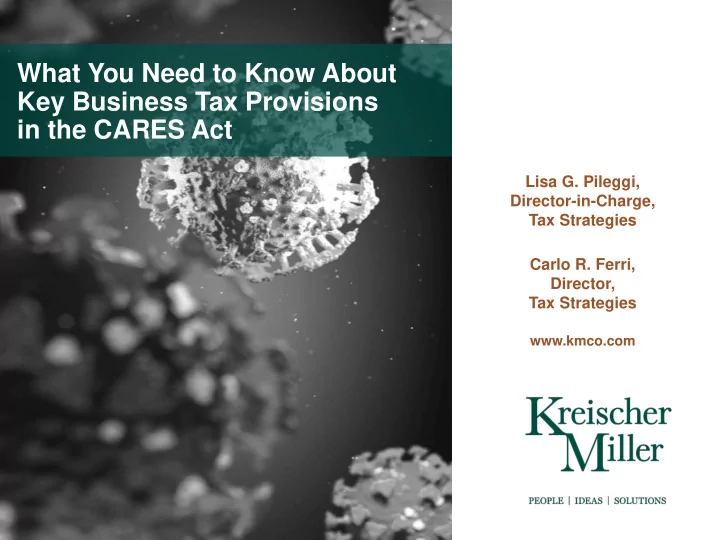

What You Need to Know About Key Business Tax Provisions in the CARES Act Lisa G. Pileggi, Director-in-Charge, Tax Strategies Carlo R. Ferri, Director, Tax Strategies www.kmco.com
2019 Tax Due Dates Federal income tax returns and Federal income tax payments the IRS postponed the April 15, 2020 due date for filing federal income tax returns and making federal income tax payments to July 15, 2020. Interest and Penalties The period beginning April 15, 2020, and ending on July 15, 2020 will be disregarded in the calculation of any interest, penalty, or addition to tax for failure to file the Federal income tax returns or to pay the Federal income taxes. Interest, penalties, and additions to tax with respect to such postponed Federal income tax filings and payments will begin to accrue on July 16, 2020. www.kmco.com 1
COVID-19 Related Legislation Interplay between COVID-19 Legislation Families First Coronavirus Coronavirus Aid, Relief, and Response Act or FFCRA Economic Security Act or the (Phase II) CARES Act (Phase III) • Refundable paid sick leave credit and the • Payroll Protection Program paid child care leave credit. • Employee Retention Credit • If there are not sufficient payroll taxes to cover the cost of qualified sick and child • Employer Payroll Tax Deferral care leave paid, employers will be able to file a request for an accelerated payment from the IRS. www.kmco.com 2
CARES Act - Title II – Business Highlights Deferred payroll tax payments An ability to delay the employer’s share of the Social Security payroll taxes until December 31, 2020, with 50 percent due on December 31, 2021 and the remaining 50% due on December 31, 2022 Net operating losses (NOLS) Businesses can carry back losses from 2018, 2019, 2020 for up to five years, and net operating losses would temporarily not be subject to taxable income limit, which may make carryback claims available to recover 2018 taxes www.kmco.com 3
CARES Act Title II – Business Highlights, Continued Modification on limitation of losses for noncorporate taxpayers Temporarily modifies the loss limitations for noncorporate taxpayers (S-corporations, Partnerships) to allow no limitation on the amount of business loss by an owner on their individual tax return. Net Interest deduction limitation An expansion of the net interest deduction limitation from 30 percent to 50 percent of adjusted taxable income for 2019 and 2020 Bonus Depreciation technical correction on qualified improvement property (QIP”) Designates QIP property to be 15 year property instead of 39 year property and now eligible for 100% bonus depreciation. This is retroactive and applicable to property place in service after December 31, 2017. This creates cash flow opportunities on refund claims on 2018 amended returns or reduction in 2019 tax liabilities www.kmco.com 4
CARES Act Title II – Business Highlights, Continued Employee retention credit for employers New Law Provides a refundable payroll tax credit for 50% of qualified wages paid by eligible employers to certain employees during the COVID-19 crisis. The maximum amount of the eligible wages for the credit is $10,000 per employee IRS is granted authority in the act to advance payments to eligible employers and waive applicable penalties for employers who do not deposit applicable payroll taxes in anticipation of the receiving the credit. The credit applies to wages paid after March 13, 2020 and before January 1, 2021 Eligible employers Available to all for profit businesses including non-profits Operations have been fully or partially suspended due to the concern about the spread of COVID-19 during any calendar quarter in 2020 OR The business has a significant decline in gross receipts by more then 50% compared to the calendar quarter in the previous year www.kmco.com 5
CARES Act Title II – Business Highlights, Continued Employee retention credit for employers Employers with less than Employer with more than 100 employees 100 employees Eligible wages includes wages paid by the Eligible wages includes all employer to the employee during the calendar employee wages paid by the quarter for periods in which the employee is not employer during the impacted working or face reduced hours as a result of their employer’s closure or reduced gross receipts calendar quarter Eligible Wages Qualified wages include the amount an employer pays to a group health plan attributable to the employee receiving qualified wages in order to provide health care benefits Other Important Considerations: Wages paid by an employer that qualifies for the credit under the mandatory paid sick leave and mandatory paid Family and Medical Act Leave are not eligible for the credit Provision includes an employer aggregation rule to determine number of employee Employer who take small business loans provided under Section 1102 for the CARES Act (Paycheck Protection Loan) are not eligible for the credit www.kmco.com 6
Contact the Presenters: kmiller@kmco.com Lisa G. Pileggi, CPA Director-in-Charge, Tax Strategies Carlo R. Ferri, CPA Director, Tax Strategies www.kmco.com 7
Thank you for your participation! www.kmco.com 8
Recommend
More recommend